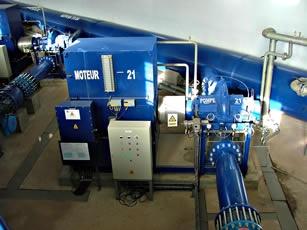At the end of July 2009, KSB Aktiengesellschaft, of Frankenthal, Germany, received an order for the extension of the Méckhé pumping station situated 100km north of Dakar, Senegal.
The order with a value of around three million euros is for the supply of a complete pump unit, a frequency inverter, the necessary transformer and automation equipment, and various valves. The order further includes a hydraulic system analysis. The variable speed pump will be driven by a powerful 2,228kW high-voltage (3,300 Volt) motor running at a speed of between 950 and 1,450 revolutions per minute.
In consideration of the sandy surroundings and wind speeds of up to 180km/h, the electric motor will be supplied with water cooling. The pump is equipped with a newly developed hydraulic system capable of generating a head of 236m with the pump running at full speed.
A system to supply drinking water
KSB supplied the equipment for the first project phase in 2006. The pumping station at Méckhé is a so-called closed system, which means that the intermediate pumping station is integrated directly into the continuous pipeline. Although this type of design does away with the need for high-maintenance buffer tanks, it does mean that automation system and system monitoring equipment have to be capable of handling highly complex conditions.
A control system specifically developed for the station makes sure the approximately 200,000 tonnes of water inside the pipeline are accelerated or slowed down in such a way that no low or excess pressures occur anywhere in the pipeline. Today, the nominal capacity of the pressure boosting station is approximately 190,000 cubic metres of water per day. Once the second phase is complete, capacity is expected to increase to a maximum of 260,000 cubic metres per day. The Senegalese capital of Dakar currently has more than three million inhabitants.
For years, the city has had to steadily increase its supply of drinking water for its rapidly expanding population. Apart from several wells near the city, the primary source of supply are two pipelines fed with water from the river Senegal and from Lake Guiers.
The two pipelines are around 240km long. Completion of the second development phase is expected for the spring of 2011.




